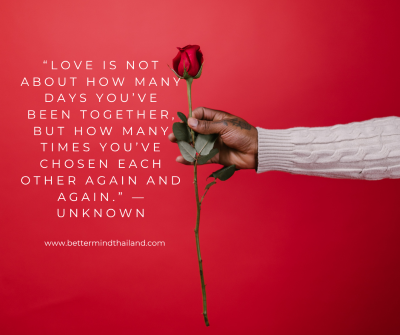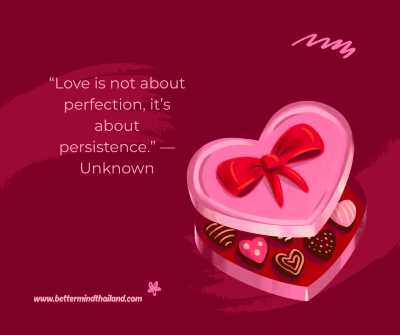Forgiveness in Relationships: Moving Beyond Pain with Mindfulness
794 จำนวนผู้เข้าชม |

Forgiveness in Relationships: Moving Beyond Pain with Mindfulness

Dr. Marid Kaewchinda (Ph.D)
Expert Counseling Psychologist specializing in EMDR and Brainspotting Therapy
Why Forgiveness Matters in Relationships
Every relationship—romantic, family, or friendship—inevitably encounters conflict and hurt. When trust is broken or expectations are unmet, emotional pain can build walls between partners.
Forgiveness is not about forgetting what happened or excusing harmful behavior. It’s about freeing yourself from the emotional burden that keeps you stuck in resentment.
When we learn to forgive mindfully, we shift from holding pain to cultivating compassion—first for ourselves, then for others.

Understanding the Nature of Forgiveness
Forgiveness doesn’t happen overnight. It’s a process of emotional healing that requires honesty, empathy, and acceptance.
According to relationship therapists, forgiveness involves three stages:
1. Acknowledging the Pain
Recognize your hurt without minimizing it. Suppressing emotions only deepens resentment.
2. Understanding the Root Cause
Explore what led to the conflict. Was it unmet needs, fear, or miscommunication?
3. Letting Go and Releasing Control
Choose peace over punishment. Forgiveness doesn’t mean reconciliation—it means emotional freedom.
Mindfulness helps you observe your emotions without judgment, allowing space for clarity and healing to emerge naturally.

How Mindfulness Supports Forgiveness
Mindfulness means staying present with your thoughts and feelings—without reacting impulsively.
When practiced consistently, mindfulness builds emotional regulation, compassion, and self-awareness—all essential for forgiveness.
Here’s how mindfulness transforms the process:
- Staying Present:
Instead of replaying the past, mindfulness brings you back to the present moment, where healing begins.
- Reducing Reactivity:
When you notice anger or pain arise, mindfulness helps you pause instead of reacting defensively.
- Cultivating Compassion:
Through mindful breathing or meditation, you develop empathy—for yourself and your partner.
- Creating Space for Growth:
By observing your emotions with curiosity rather than judgment, you allow the heart to soften.
Mindful forgiveness turns pain into wisdom and transforms relationships into opportunities for deeper connection.

Practical Steps to Practice Forgiveness Mindfully
Here are some mindfulness-based steps to move beyond pain:
- Pause and Breathe:
When painful memories arise, take slow, deep breaths. This helps calm your nervous system.
- Journal Your Feelings:
Write about what happened and how it affected you.
- Acknowledge your emotions honestly.
Practice Loving-Kindness Meditation: Send thoughts of kindness to yourself, and gradually extend them to the person who hurt you.
- Set Boundaries:
Forgiveness does not mean tolerating harm. Mindfulness also teaches healthy detachment.
- Seek Professional Support:
- Rebuilding Trust After Forgiveness
After forgiveness, rebuilding trust takes time and consistency. Both partners must commit to transparency, empathy, and mindful communication.
Try these mindful relationship practices:
- Listen with presence, not defense.
- Express needs calmly and clearly.
- Avoid blame—focus on shared understanding.
- Celebrate small steps of reconnection.
Over time, mindfulness helps turn forgiveness into a daily practice—one that strengthens your relationship’s emotional foundation.

Final Thoughts
Forgiveness is not weakness—it’s emotional courage.
It’s the act of releasing pain, reclaiming your peace, and choosing growth over bitterness.
When you combine forgiveness with mindfulness, you transform suffering into understanding, and wounds into wisdom. Whether you’re healing from betrayal, disappointment, or miscommunication, mindfulness allows you to reconnect—with yourself and your loved one—with renewed compassion and trust.
Suggested articles
- Understanding Infidelity and How to Heal Your Relationship
- Mindfulness-Based Therapy: How It Heals Emotional Pain
- EMDR Therapy for Relationship Trauma







